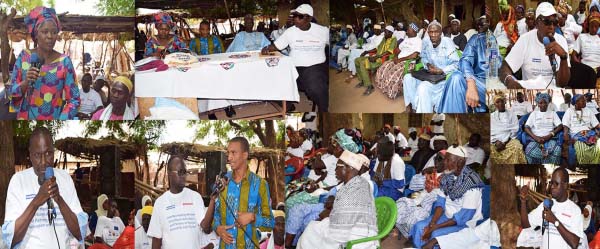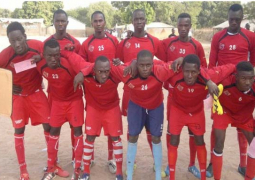
The
first ever interface meeting between partners of ActionAid and Jangjangbureh
Area Council has ended with a series of recommendations aimed at making
positive reforms to the council. The meeting, held in Kudang in the Central
River Region on Thursday 18th May, brought together ActionAid partners, staff
of Jangjangbureh Area council, the chiefs of Niamina East, Niamina West and
Niamina Dankunku districts, ward councilors, alkalolu, religious and
traditional leaders, women and youth leaders, VDC chairpersons and a cross
section of community members from the Central River Region and other areas of
the country.
The interface, which was very lively and
interactive, recommended greater people participation which should also include
ward councilors and Village Development Committees in the planning process and
implementation of development activities, the development of a strategic plan
for the council, restructuring or downsizing the staff on payroll for quality
service delivery, at least 30% of the total revenue collected to be given back
to the districts for their own development initiatives. Other key
recommendations are capacity building and awareness creation at community level
especially for ward councilors on issues surrounding council’s operations and
for the council to engage government to negotiate other sources of revenue
outlets.
Jangjangbureh
Area Council has been faced with a lot of challenges of revenue generation and
utilization. The annual projected revenue for council is 2 million dalasi, yet
it collects only 40% of that amount. The council’s expenditure far exceeds what
it generates, is overstaffed with staff not been paid salaries for the past 2
months. The non-participation of people in how council’s revenue is utilized
has led to some taxpayers refusing to pay tax because they claim they do not
know how their money is spent.
At
the interface meeting, the Governor of CRR Sulayman Barry commended ActionAid
for organizing what he called a very important meeting as it facilitates a healthy
exchange of ideas between Council and the communities. “There is a need for
people to know where their money is being spent and the Area Council should
tell them”, he said. The Governor also called for greater people participation
in how their money is being utilized.
The
Executive Director of ActionAid The Gambia through the Programme Specialist for
Women’s Rights Fanta Jatta Sowe re-emphasized the importance of the meeting to
the tax payers who have a right to know how tax paid is utilized. Part of the
accountability process is to strengthen good governance and Fanta highlighted
the Gambia’s new democracy which she said we need to nurture. ‘There is a need
for the rights holders to pay taxes so that resources will be available to be
utilized for the development of their communities as depending on outside
resources is not sustainable” The LRP Manager Dr. Saikou Sanyang dwelt on the
work of ActionAid, its four strategic objectives and their relevance to the
lives of the people.
In
a speech punctuated with loud applause, the Chief of Niamina East Kebba Touray
commended ActionAid for its relentless and tireless efforts to eradicate
poverty and injustice in the district. He advised people to pay their taxes
regularly and for council to be more transparent on how revenue is utilized.
The Chief was applauded for spearheading the first ever district tribunal to
include women in the country.
The
presentations that followed were made by the Chief Executive Officer, the
Finance Director and the Development Officer of Jangjangbureh Area Council. It
was revealed that Council’s projected revenue is 2 million dalasi annually yet
it collects only 40% of that amount. Moreover, council is not the only tax
collecting body. Other players like Gambia Revenue Authority, National Road
Authority, Gambia Tourism Board and Gambia Livestock Marketing Agency all
collect taxes in areas where Jangjangbureh Area Council was the sole collector.
The Ministry of Local Government and Regional Integration has commissioned a
consultancy on local government reforms on decentralization and to come up with
recommendations.
During the question and answer session,
community members asked why it has taken so long for Jangjangbureh Area Council
to conduct such an interface, what plans will be put in place to curb the
council’s high expenditure, why punitive measures are not taken against tax
defaulters and whether the women district tribunal members are being paid by
council These were just some of the questions posed by members of the public for
enhanced understanding of revenue generation and utilization.
Over
the coming months, ActionAid will provide support to Jangjangbureh Area Council
for the development of a five year strategic plan and Memorandum of
Understanding. The council will also work towards implementing the
recommendations made during the meeting.



